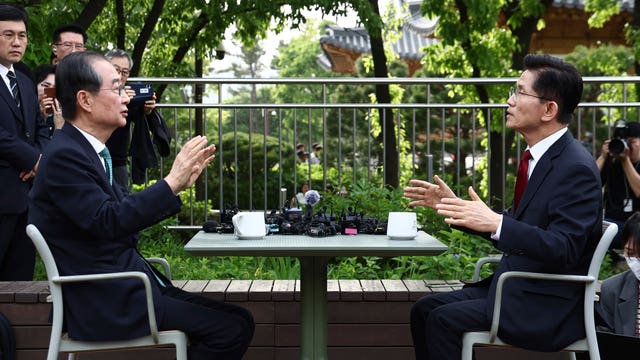Party switches candidates ahead of South Korean presidential election
Kim Moon Soo was replaced as the People Power Party candidate by former prime minister Han Duck-soo a week after his selection.

South Korea’s embattled conservative party has taken the unprecedented step of replacing its presidential candidate Kim Moon Soo, a week after his selection.
The party nullified the primary result and replaced Mr Kim with former prime minister Han Duck-soo, deepening internal turmoil ahead of the June 3 presidential by-election.
Saturday’s move by the People Power Party’s (PPP) leadership, which Mr Kim denounced as an “overnight political coup”, underscores the desperation and disarray within the party following the ousting of former president Yoon Suk Yeol over his ill-fated attempt to impose martial law in December.
Mr Kim, a staunch conservative and former labour minister under Mr Yoon, was named the PPP’s presidential candidate on May 3 after winning 56.3% of the primary vote, defeating a reformist rival who had criticised the martial law bid.

But the PPP’s leadership, dominated by Yoon loyalists, has spent the past week pressuring him to step aside and back Mr Han, the man they believe stands a stronger chance against liberal Democratic Party front-runner Lee Jae-myung.
Mr Han served as acting president after Mr Yoon was impeached by the legislature in December and officially removed by the Constitutional Court in April.
He resigned from office on May 2 to pursue a presidential bid, arguing his long public service career qualifies him to lead the country amid growing geopolitical uncertainty and trade challenges intensified by the policies of US President Donald Trump.
After failed talks between the two men to unify their candidacies, the PPP’s emergency committee cancelled Mr Kim’s nomination in the early hours of Saturday and officially registered Mr Han as a party member and its new presidential candidate.
The replacement still requires confirmation through an all-party vote on Saturday and approval by the party’s national committee on Sunday, which is the deadline for candidates to register with the election authorities.
In a message issued through the party, Mr Han claimed: “If we unite, we can surely win.”
Speaking at a news conference, Mr Kim lamented “democracy in our party died” and vowed to take unspecified legal and political steps, but it remained unclear whether any realistic path existed to restore his candidacy without the party’s cooperation.
He had opposed the legislature’s impeachment of Mr Yoon on December 14, although he said he disagreed with the decision to declare martial law on December 3.
Mr Kim had gained popularity among hard-line PPP supporters after he solely defied a December 11 demand by an opposition politician that all cabinet members stand and bow in a gesture of apology for Mr Yoon’s martial law enactment at the Assembly.
Both men have lagged well behind Mr Lee in recent opinion polls.
Mr Lee, who spearheaded the Democrats’ efforts to oust Mr Yoon, ridiculed the PPP efforts to switch candidacies, telling reporters: “I have heard of forced marriages but never heard of forced unity.”
He has long cultivated an image as an anti-establishment figure capable of tackling South Korea’s entrenched inequality and corruption, but critics view him as a populist who fuels division and vilifies opponents, warning his leadership could further polarise the country.
He currently faces five trials for corruption and other criminal charges.
If he becomes president, those trials are likely to stop because of special presidential immunity from most criminal charges.





